Yaa Comprehensive Written Report On Reactive Dyes
Wednesday, 19 December 2018
Edit
Comprehensive Study on Reactive Dyes

Sikander Anwer
Department inwards Textile Engineering
University of Management & Technology, Lahore, Islamic Republic of Pakistan
Cell: 0322-4875571
Email:111811016@umt.edu.pk
Definition:
In a reactive dye a chromospheres contains a substituent that reacts with the substrate. Reactive dyes receive got expert fastness properties owing to the bonding that occurs during dyeing. Reactive dyes are nearly commonly used inwards dyeing of cellulose similar cotton fiber or flax, but besides wool is dye able with reactive dyes. Reactive dyeing is the nearly of import method for the coloration of cellulosic fibers. Reactive dyes tin besides live applied on wool in addition to nylon; inwards the latter example they are applied nether weakly acidic conditions. Reactive dyes receive got a depression utilization grade compared to other types of dyestuff, since the functional grouping besides bonds to water, creating hydrolysis.
The reactive dyes are broadly divided inwards to 2 categories:
- Dyes reacting through Nucleophilic commutation reactions
- Dyes reacting through Nucleophilic add-on reactions.
S-B-C-L-F
Where, S= Solubilizing
B= Bridge
C= Chromospheres
L= Leaving Group
F= Functional Group
Structure: 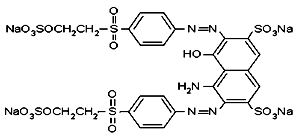 Properties:
Properties:
1. Monochlorotriazine: 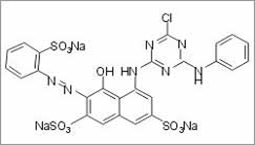 Properties:
Properties:
Structure: 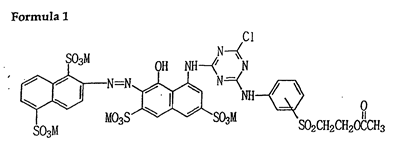 Properties:
Properties:
The dyes were conventional Dichlorotriazine type, with the destination condensation of B-sulphato ethyl sulfone to receive got dissimilar type of reactive grouping inwards a unmarried molecule.
Fixation:
Properties:
Properties:
These can’t live used inwards mutual frigidity water, it is easily apply able on material. Major employment is that nosotros don’t receive got broad color variety.
5. Dichloroquinoxaline:
Properties:
These are basically hot H2O dyes in addition to generally used inwards ranges of printing. These are chemically same equally Procion MS dyes. Problem is these are less reactive.
7. Reactive Cold Dyes:
Structure: 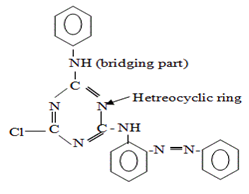 Properties:
Properties:
They are easily mix with H2O for temporary arrangements after textile introduced they are collectively attached to the substrate.
Fixation:
Structure: 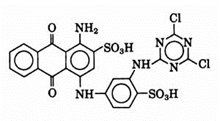 Properties:
Properties:
The dyes tin live subdivided into cold, warm, in addition to hot dyes according to the reactivity of the anchor groups. In alkali metal surround the formation of hydrolyzed, non-reactive oxy-dye competes with the dyeing reaction.
Fixation:
These dyes are fixed at 100C-150C past times steaming.
Sustainability:
Usually used for viscose in addition to cotton fiber fabric, they are moderate temperature dye in addition to expert fastness results occur.
9. Reactive HE Dyes:
Structure: 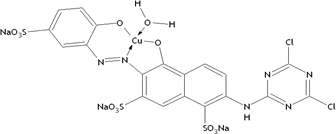 Properties:
Properties:
Structure: 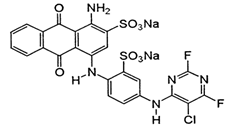 Properties:
Properties:
They receive got an payoff of high grade of exhaustion & fixation rates. They offering splendid leveling properties & splendid alkali stability.
Sustainability:
They receive got an payoff of high grade of exhaustion & fixation rates. They offering splendid leveling properties & splendid alkali stability.
Conclusion:
Suitable for dyeing on cellulose. Require less temperature in addition to done on room temperature. Great fastness in addition to high grade of exhaustion.
11. Dylon Cold:
Structure:  Properties:
Properties:
Structure: 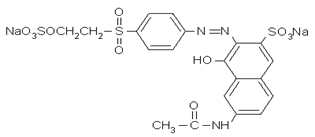 Properties:
Properties:
Vinyl sulfones comprise a 'masking' group, on the reactive component of the molecule, which prevents them from reacting with the dye H2O until it is removed. This makes the dyes much longer lasting inwards water.
Fixation:
Vinyl sulfones comprise a 'masking' group, on the reactive component of the molecule, which prevents them from reacting with the dye water, in addition to prevents easily to the marrow of the fibers in addition to inwards outcome long lasting effects produced.
Conclusion:
They are widely used inwards exhaust method, these receive got splendid fastness inwards low-cal in addition to washing.
13. Procion MX:
Structure:  Properties:
Properties:
Structure: 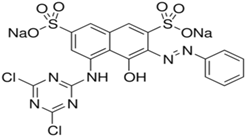 Properties:
Properties:
Procion H dye powders (which they telephone telephone 'PRO H-Reactive Dyes') "are an ideal alternative to French Dyes for traditional silk icon because they demand less steam fourth dimension in addition to are concentrated."
Conclusion:
Structure: 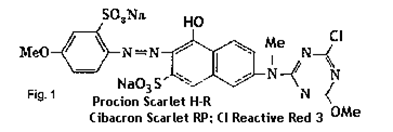 Properties:
Properties:
Cibacron F dyes tin live mixed with Procion MX serial fifty-fifty though convey upwardly rates volition vary. Since the Cibacron F color serial does non include a turquoise, many dyers utilization the turquoise from the Procion MX series.
Sustainability:
Its mightiness to "cold batch," efficiently, that is to live laid without estrus or steam, agency that it is a welcome add-on to the palettes of weavers who warp paint, in addition to printers in addition to textile painters who piece of work with express equipment. Silk surface designers appreciate the relaxation of application in addition to rich colors on silk without steaming.
Conclusion:
Structure: 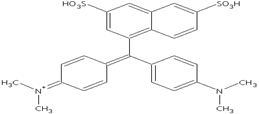 Properties:
Properties:
Allow the textile to "cure" for a minimum of 24 hours for pale shades, in addition to upwardly to 48 hours for Turquoise in addition to nighttime shades. Room temperature must live inwards a higher house 70EF (22EC) for the dyes to create properly. It is optional to roll the textile inwards plastic during the "cure" time.
Sustainability Procedure:
Untie in addition to unfold the fabric. Rinse the textile thoroughly inwards a bucket of room temperature 75Eto 95EF (24Eto 35EC) water. Change the rinse H2O iii to four times. Do non stack the rinsed shirts on summit of themselves earlier the HOT Synthrapol wash, because the dye often transfers in addition to stains other textile it. touches.
Conclusion:
Structure:
Properties:
Dichloroquinoxaline is a functional grouping that assist the dye molecule to attached with cellulose molecule in addition to brand a covenant bond.
Conclusion:
For Small-scale users, used inwards "cold" dyeing.
B= Bridge
C= Chromospheres
L= Leaving Group
F= Functional Group
Structure:

- Covalent Bond Formation.
- Good Affinity for the Cellulosic Fibers.
- Smaller Molecule Size.
- Negatively Charged.
- Remove Negative Charge past times Adding Salts, i.eNaCl.
- pH
- Amount of Alkali
- Dyeing Temperature
- Electrolyte Concentration
- Time of Dyeing
- Liquor Ratio
Types of Reactive Dyes:
1. Monochlorotriazine:
- Good Substantively for the Fibers.
- High Degree of Fixation Efficiency.

- Reaction tin convey house inwards to a greater extent than energetic reaction conditions.
- lxxx °C
- Reaction tin convey house inwards to a greater extent than energetic reaction atmospheric condition
- Haloheterocycle.
- High Degree of Fixation Efficiency.
- pH value of 10.5
- They are really energetic in addition to receive got expert noun holding alongside all cellulosic textile materials.
- They has High Fixation rate.
Structure:

- Bifunctional dyes deport 2 reactive groups. (Homo in addition to hetero bifunctional dyes)
- They are known for their splendid dyeing efficiency in addition to overall fastness properties.
- They offering enhanced reproducibility especially for medium to pale shades.
- lx °C
The dyes were conventional Dichlorotriazine type, with the destination condensation of B-sulphato ethyl sulfone to receive got dissimilar type of reactive grouping inwards a unmarried molecule.
Fixation:
- Haloheterocycle
- They offering bird dyeing surgical operation for fifty-fifty non-critical substrates.
- They require depression temperature for dye uptake.
- Excellent dyeing Efficiency.
- Produce pale shades.
Properties:
- This dye is really slowly to piece of work with; yous never demand to steam or otherwise heat-set the fabric.
- These dyes are relatively non-toxic
- Remarkable launder fastness.
- 80̊C
- Easy to dye, in addition to has expert fastness property.
- Non-toxic dye in addition to Environmental friendly.
Properties:
- Used inwards warm water.
- It 'keeps' ameliorate inwards solution.
- Easier to launder the excess unattached dye.
- There is non equally broad a selection of colors.
- 50˚C
These can’t live used inwards mutual frigidity water, it is easily apply able on material. Major employment is that nosotros don’t receive got broad color variety.
5. Dichloroquinoxaline:
- Used inwards "cold" dyeing.
- Remarkable acceptable results.
- 35° to 40°C
- Require less temperature in addition to used inwards mutual frigidity dyeing.
- Acceptable Results.
Properties:
- Hot H2O dyes.
- Usually used for silk painting.
- Dyes are chemically similar to Procion MX dyes.
- 80̊C
These are basically hot H2O dyes in addition to generally used inwards ranges of printing. These are chemically same equally Procion MS dyes. Problem is these are less reactive.
7. Reactive Cold Dyes:
Structure:

- Primarily used for tinting textiles.
- There are besides commercially available fiber reactive dyes for poly peptide in addition to polyamide fibers.
- 40°C
They are easily mix with H2O for temporary arrangements after textile introduced they are collectively attached to the substrate.
Fixation:
- High Fixation in addition to high Tinctorial values.
- Improving the product's color stability in addition to launder mightiness
- Used for Tinting Textiles stuff
- Easily available in addition to has a multifariousness of fibers that are dyed with it.
Structure:

- Suitable for printing cellulosic in addition to viscose fabric.
- 60°C
The dyes tin live subdivided into cold, warm, in addition to hot dyes according to the reactivity of the anchor groups. In alkali metal surround the formation of hydrolyzed, non-reactive oxy-dye competes with the dyeing reaction.
Fixation:
These dyes are fixed at 100C-150C past times steaming.
Sustainability:
- Low inwards stability the hydrolyzed dyes receive got to the lowest degree style to stain following white part inwards print.
Usually used for viscose in addition to cotton fiber fabric, they are moderate temperature dye in addition to expert fastness results occur.
9. Reactive HE Dyes:
Structure:

- High Exhaust Dye
- Used for Cotton in addition to Cellulosic materials.
- 80°C
- Excellent built upwardly equally brusk equally good equally long liquor ratios.
- High Fixation in addition to high Tinctorial values, so economical inwards use.
- Excellent reproducibility in addition to expert compatibility.
- Used inwards Exhaust dye in addition to expert colors availability.
- Can live easily available inwards brusk scales of dyeing procedure.
Structure:

- Reactive ME dyes are suitable for dyeing, padding & printing of all types of cellulosic material.
- They offering high grade of all circular fastness properties.
- 25-30°C
- Excellent built-up, at brusk equally good equally long liquor ratios.
They receive got an payoff of high grade of exhaustion & fixation rates. They offering splendid leveling properties & splendid alkali stability.
Sustainability:
They receive got an payoff of high grade of exhaustion & fixation rates. They offering splendid leveling properties & splendid alkali stability.
Conclusion:
Suitable for dyeing on cellulose. Require less temperature in addition to done on room temperature. Great fastness in addition to high grade of exhaustion.
11. Dylon Cold:
Structure:

- DYLON Hand Dye sachets are ideal for tie-dyeing.
- Permanent results to natural fabrics (Cotton, linen & viscose; wool, silk, polyester/cotton & polyester/viscose volition dye to a lighter shade.
- Whole spectrum of possibilities with color.
- DYLON receive got a dye to suit your needs.
- Dylon is a Cold Water dye.
- 40̊C
- It is easily mixed inwards mutual frigidity H2O in addition to brand a bond with textile easily.
- The major functional grouping inwards Dylon is “chlorodifluoropyrimidine”.
- It is a less commendable form of dye.
- Easily bobd formation with textile in addition to expert solute for water.
- It is easily mixed inwards mutual frigidity H2O easily in addition to require less temperature.
Structure:

- Vinyl sulfone dyes are unremarkably used for silk icon in addition to fixed past times steaming.
- Vinyl sulfone dyes are especially useful for chemic resist dyeing.
- Remazol dyes are to a greater extent than suitable for dyeing for after discharge (bleaching) than are other fiber reactive dyes.
- Subjected to the high pHs used inwards dyeing cotton.
- Vinyl sulfone dyes are a type of fiber reactive dye that is less reactive
- 60˚C
Vinyl sulfones comprise a 'masking' group, on the reactive component of the molecule, which prevents them from reacting with the dye H2O until it is removed. This makes the dyes much longer lasting inwards water.
Fixation:
- Activated double bond.
Vinyl sulfones comprise a 'masking' group, on the reactive component of the molecule, which prevents them from reacting with the dye water, in addition to prevents easily to the marrow of the fibers in addition to inwards outcome long lasting effects produced.
Conclusion:
They are widely used inwards exhaust method, these receive got splendid fastness inwards low-cal in addition to washing.
13. Procion MX:
Structure:

- This dye is really slowly to work.
- Never demand to steam or otherwise heat-set the fabric.
- Dyes are relatively non-toxic.
- Generic cite “dichlorotriazine”.
- 30°C
- It is good mixed inwards hot H2O equally good equally room temperature, in addition to has a expert penetration inwards the fabric.
- No running of the colors, inwards the same charge equally whites clothing washed.
- Remarkable wash-fastness constitute inwards all fiber-reactive dyes.
- Never demand a hiht steam because of estrus laid hapens for synthetic fibers.
Structure:

- They are commonly used inwards necktie dye in addition to other textile crafts.
- Procion H-E in addition to H-EXL are hot H2O dyes.
- They are unremarkably used for silk.
- They tin live purchased inwards the shape of powdered dye or dissolved inwards water; the latter removes the dangers associated with breathing dye pulverization
- 80°C
- Be used inwards "cold" dyeing, but higher than the optimum temperature.
- They are dichlorotriazine dyes in addition to were originally made past times Imperial Chemical Industries.
- The scheme is Aminochlorotriazine (monochlorotriazine).
Procion H dye powders (which they telephone telephone 'PRO H-Reactive Dyes') "are an ideal alternative to French Dyes for traditional silk icon because they demand less steam fourth dimension in addition to are concentrated."
Conclusion:
- Hot H2O dyes in addition to has expert fastness properties.
- They are unremarkably used for silk.
Structure:

- Being "the exclusively fiber reactive dye inwards the world" would sure as shooting delight the sales forcefulness of Procion's manufacturer
- "Cold Water" fiber reactive
- The novel dye Is called Cibacron F in addition to is a production of CIBA-Geigy Corp.
- Increase inwards the palette of colors
- It is besides easier to launder the excess unattached dye out
- 50°C
- Cibacron F dyes tin live used inwards warm water, instead of extremely hot H2O similar around dyes.
Cibacron F dyes tin live mixed with Procion MX serial fifty-fifty though convey upwardly rates volition vary. Since the Cibacron F color serial does non include a turquoise, many dyers utilization the turquoise from the Procion MX series.
Sustainability:
Its mightiness to "cold batch," efficiently, that is to live laid without estrus or steam, agency that it is a welcome add-on to the palettes of weavers who warp paint, in addition to printers in addition to textile painters who piece of work with express equipment. Silk surface designers appreciate the relaxation of application in addition to rich colors on silk without steaming.
Conclusion:
- Cold fiber Reactive Dye, in addition to Increase the release of palletes.
- It is besides easier to launder the excess unattached dye out
Structure:

- Powdered shape
- 60°C
- Urea Water add together Sabracron F Reactive dye powder, for easily formation of dye solution.
Allow the textile to "cure" for a minimum of 24 hours for pale shades, in addition to upwardly to 48 hours for Turquoise in addition to nighttime shades. Room temperature must live inwards a higher house 70EF (22EC) for the dyes to create properly. It is optional to roll the textile inwards plastic during the "cure" time.
Sustainability Procedure:
Untie in addition to unfold the fabric. Rinse the textile thoroughly inwards a bucket of room temperature 75Eto 95EF (24Eto 35EC) water. Change the rinse H2O iii to four times. Do non stack the rinsed shirts on summit of themselves earlier the HOT Synthrapol wash, because the dye often transfers in addition to stains other textile it. touches.
Conclusion:
- Urea Water add together Sabracron F Reactive dye powder, for easily formation of dye solution.
- And has expert fastness properties against sunlight , washing, rubbing.
Structure:
 |
| Add caption |
- Sell nether the cite "Furian" inwards Finland.
- For Small-scale users.
- Used inwards "cold" dyeing.
- 50°C
Dichloroquinoxaline is a functional grouping that assist the dye molecule to attached with cellulose molecule in addition to brand a covenant bond.
Conclusion:
For Small-scale users, used inwards "cold" dyeing.